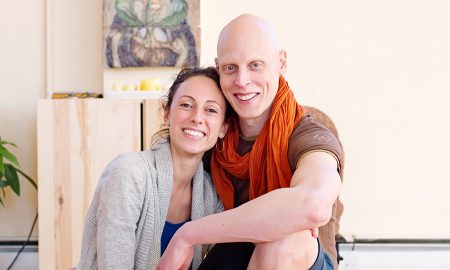

Today we’d like to introduce you to Alexander Mandelbraut.
Alexander, can you briefly walk us through your story – how you started and how you got to where you are today.
My story began 5,000 miles east of Boston, in the former Soviet Union. I was born in Ukraine, but spent my formative years in Lithuania. Like many European Jews, my family was oppressed by antisemitism. We immigrated to the United States in search of a better life. Our first home was in Baltimore – a shabby one-bedroom apartment that housed my wife and me along with our two-year-old son. Even though I was an engineer, I couldn’t find work with my limited English. I had to take the first job I could get: delivering pizza. My wife – who was also an engineer – worked in a factory. The first few years were tough, but, sticking together, we made ends meet. Eventually, my wife and I assimilated a broader spectrum of conversational phrases and honed our foreign accents. Learning how to speak English made it easier to find a job. My wife secured a position with an engineering firm in Boston. I pursued a career in international trade–buying goods in one country and selling them in another. With a few more dollars in our pockets, we packed our bags and moved up north. After years of working in foreign commerce, the trading industry began to change. Internet-based suppliers made it harder for middlemen to earn a profit. I decided to try my hand at another form of arbitrage: real estate development. By this time, most of my family, including my parents, brother, and in-laws had also immigrated to Boston. Working with my father, who was a construction supervisor by trade, and my wife, I began to purchase, renovate, and sell multifamily properties. We started small, renovating just one building per year. Though we didn’t make much money, we gained a lot of experience. After two or three projects, we learned how to work more efficiently and, subsequently, we increased our margins. Almost fifteen years later, we’ve grown into a full-scale real estate design and development firm. We build close to fifteen condominiums each year and complete over one hundred design projects. Our clients include some of the area’s largest developers as well as local homeowners and commercial businesses. We also opened our own brokerage, which specializes in luxury condominium and investment property sales. The journey from being a poor immigrant to an established businessman has been a difficult one. Without having the unwavering support of my family and friends – as well as a quite a bit of luck – I would not have achieved a fraction of my current success. Though I’ve been able to grow my business over the years, the achievement that I’m most proud of is creating a platform for my children’s future success.
Has it been a smooth road?
How would you feel if your entire life’s savings were invested into one deal? Could you imagine going into work every day not knowing whether you’ll make any money? What if you didn’t know when to anticipate your next paycheck? These are realities for most real estate developers. The hardest part of our business is getting started. Purchasing real estate – particularly in Boston – requires hundreds of thousands, or even millions, of dollars. Without access to capital, it’s impossible to build anything. My first challenge as a developer was saving enough money to afford the down-payment on a multifamily building. At first, I couldn’t do it all by myself. I had to borrow money from friends and relatives, who were, in return, promised the lion’s share of the profit. Once I could put together the funds, I had to find a bank that would be willing to finance the rest. This was my second challenge: making connections within the lending industry. It turns out that financial institutions are skeptical about lending money to first-time builders. Even though I was financially stable and my credit was stellar, most banks didn’t want to take a chance on me. I had to collateralize my home to get my first commercial mortgage. This meant that I would be subject to losing my home – in addition to my investment property – if I defaulted on the loan. Like I said, real estate development is not a business for the faint of heart. Thankfully, I passed my first test with flying colors. My third challenge was understanding Boston’s real estate market, block-by-block. Each one of the city’s neighborhoods, and, sometimes, even its individual streets, has its own economy, culture, and aesthetic. These nuances can inform a developer’s building style. In some of my earlier projects, I focused too heavily on European design, ignoring the importance of local demand. This made my projects less appealing to American buyers. With time and experience, I developed a building concept that appealed to a broader audience. Though I’ve been in business for many years, I still continue to encounter challenges on a regular basis. Fortunately, my past experiences have given me a road map for navigating them.
We’d love to hear more about your business.
As I mentioned earlier, our company is a multifaceted real estate development firm that specializes in architectural and structural design, building, and sales. The reason I saw “our” is because AJM Group is a family business. My father, brother, wife, and son each play a meaningful role in the company’s success. We rely on our family values – communication, accountability, and care – to create a positive experience for each of our clients. Though it sounds cliché, our commitment to customer service sets us apart from larger firms. Over the course of a year, we complete over one hundred design projects. Some of our clients include homeowners, developers, and commercial businesses. We also do three to five condominium conversions. What that means, in simple terms, is that we buy old multifamily buildings, renovate them, and sell them as condos. In addition to designing and building homes, we also own a real estate brokerage, AJM Group Realty, which focuses on luxury condominium and investment property sales. Regardless of whether we’re designing, building, or selling a property, we always take a customer-centered approach to business, making sure that our product or service fits our clients’ needs and lifestyles.
Is our city a good place to do what you do?
Boston has become a challenging city for developers to work in, particularly for those who are just starting out. While there are a variety of reasons that could explain this, I believe that the challenges of working in Boston can be summarized with one simple economic concept: supply and demand. The city’s zoning laws – the rules that govern new construction – are extremely conservative. This makes is difficult for developers to keep up with the city’s growing demand for housing. As a result of this deficit, the price of real estate has grown exponentially, giving sellers an edge when it comes to negotiations. In dense locations, like the Back Bay or South End, tens of builders can be found fighting over the same property. Pitting one developer’s offer against another, sellers force builders to trim their margins for sake of their business’s continuity. After all, without a steady flow of projects, it’s hard for developers to earn a living. In order to stabilize prices, the city must allow developers to build larger, multi-unit complexes. This would require an overhaul of the city’s prohibitive zoning bylaws—which is something that nearby towns have already implemented. Considering the challenges of working in Boston, I would advise new developers to start out in a less competitive market until they’ve learned to navigate the many challenges of working in the real estate industry. With local prices at all-time highs, there’s no longer room for error.
Contact Info:
- Address: AJM Group, Inc.
21 Highland Ave
Needham, MA 02494 - Website: www.ajmgroup.com
- Phone: (617) 974-7007
- Email: benm@ajmgroup.com
- Facebook: https://www.facebook.com/ajmgroupinc/







 Image Credit:
Image Credit:
Boston REP
Briggs Johnson Photography
Yuri Vaysgant Photography
Yuri Vaysgant Photography
Boston REP
Briggs Johnson Photography
Our own picture – no credit necessary
Brian Renke
Getting in touch: BostonVoyager is built on recommendations from the community; it’s how we uncover hidden gems, so if you know someone who deserves recognition please let us know here.

















